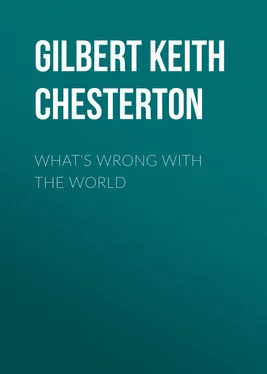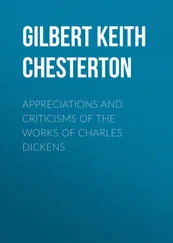Gilbert Chesterton - What's Wrong with the World
Здесь есть возможность читать онлайн «Gilbert Chesterton - What's Wrong with the World» — ознакомительный отрывок электронной книги совершенно бесплатно, а после прочтения отрывка купить полную версию. В некоторых случаях можно слушать аудио, скачать через торрент в формате fb2 и присутствует краткое содержание. Издательство: Иностранный паблик, Жанр: foreign_antique, foreign_prose, на английском языке. Описание произведения, (предисловие) а так же отзывы посетителей доступны на портале библиотеки ЛибКат.
- Название:What's Wrong with the World
- Автор:
- Издательство:Иностранный паблик
- Жанр:
- Год:неизвестен
- ISBN:нет данных
- Рейтинг книги:4 / 5. Голосов: 1
-
Избранное:Добавить в избранное
- Отзывы:
-
Ваша оценка:
- 80
- 1
- 2
- 3
- 4
- 5
What's Wrong with the World: краткое содержание, описание и аннотация
Предлагаем к чтению аннотацию, описание, краткое содержание или предисловие (зависит от того, что написал сам автор книги «What's Wrong with the World»). Если вы не нашли необходимую информацию о книге — напишите в комментариях, мы постараемся отыскать её.
What's Wrong with the World — читать онлайн ознакомительный отрывок
Ниже представлен текст книги, разбитый по страницам. Система сохранения места последней прочитанной страницы, позволяет с удобством читать онлайн бесплатно книгу «What's Wrong with the World», без необходимости каждый раз заново искать на чём Вы остановились. Поставьте закладку, и сможете в любой момент перейти на страницу, на которой закончили чтение.
Интервал:
Закладка:
It may be said that this institution of the home is the one anarchist institution. That is to say, it is older than law, and stands outside the State. By its nature it is refreshed or corrupted by indefinable forces of custom or kinship. This is not to be understood as meaning that the State has no authority over families; that State authority is invoked and ought to be invoked in many abnormal cases. But in most normal cases of family joys and sorrows, the State has no mode of entry. It is not so much that the law should not interfere, as that the law cannot. Just as there are fields too far off for law, so there are fields too near; as a man may see the North Pole before he sees his own backbone. Small and near matters escape control at least as much as vast and remote ones; and the real pains and pleasures of the family form a strong instance of this. If a baby cries for the moon, the policeman cannot procure the moon – but neither can he stop the baby. Creatures so close to each other as husband and wife, or a mother and children, have powers of making each other happy or miserable with which no public coercion can deal. If a marriage could be dissolved every morning it would not give back his night’s rest to a man kept awake by a curtain lecture; and what is the good of giving a man a lot of power where he only wants a little peace? The child must depend on the most imperfect mother; the mother may be devoted to the most unworthy children; in such relations legal revenges are vain. Even in the abnormal cases where the law may operate, this difficulty is constantly found; as many a bewildered magistrate knows. He has to save children from starvation by taking away their breadwinner. And he often has to break a wife’s heart because her husband has already broken her head. The State has no tool delicate enough to deracinate the rooted habits and tangled affections of the family; the two sexes, whether happy or unhappy, are glued together too tightly for us to get the blade of a legal penknife in between them. The man and the woman are one flesh – yes, even when they are not one spirit. Man is a quadruped. Upon this ancient and anarchic intimacy, types of government have little or no effect; it is happy or unhappy, by its own sexual wholesomeness and genial habit, under the republic of Switzerland or the despotism of Siam. Even a republic in Siam would not have done much towards freeing the Siamese Twins.
The problem is not in marriage, but in sex; and would be felt under the freest concubinage. Nevertheless, the overwhelming mass of mankind has not believed in freedom in this matter, but rather in a more or less lasting tie. Tribes and civilizations differ about the occasions on which we may loosen the bond, but they all agree that there is a bond to be loosened, not a mere universal detachment. For the purposes of this book I am not concerned to discuss that mystical view of marriage in which I myself believe: the great European tradition which has made marriage a sacrament. It is enough to say here that heathen and Christian alike have regarded marriage as a tie; a thing not normally to be sundered. Briefly, this human belief in a sexual bond rests on a principle of which the modern mind has made a very inadequate study. It is, perhaps, most nearly paralleled by the principle of the second wind in walking.
The principle is this: that in everything worth having, even in every pleasure, there is a point of pain or tedium that must be survived, so that the pleasure may revive and endure. The joy of battle comes after the first fear of death; the joy of reading Virgil comes after the bore of learning him; the glow of the sea-bather comes after the icy shock of the sea bath; and the success of the marriage comes after the failure of the honeymoon. All human vows, laws, and contracts are so many ways of surviving with success this breaking point, this instant of potential surrender.
In everything on this earth that is worth doing, there is a stage when no one would do it, except for necessity or honor. It is then that the Institution upholds a man and helps him on to the firmer ground ahead. Whether this solid fact of human nature is sufficient to justify the sublime dedication of Christian marriage is quite an other matter, it is amply sufficient to justify the general human feeling of marriage as a fixed thing, dissolution of which is a fault or, at least, an ignominy. The essential element is not so much duration as security. Two people must be tied together in order to do themselves justice; for twenty minutes at a dance, or for twenty years in a marriage In both cases the point is, that if a man is bored in the first five minutes he must go on and force himself to be happy. Coercion is a kind of encouragement; and anarchy (or what some call liberty) is essentially oppressive, because it is essentially discouraging. If we all floated in the air like bubbles, free to drift anywhere at any instant, the practical result would be that no one would have the courage to begin a conversation. It would be so embarrassing to start a sentence in a friendly whisper, and then have to shout the last half of it because the other party was floating away into the free and formless ether. The two must hold each other to do justice to each other. If Americans can be divorced for “incompatibility of temper” I cannot conceive why they are not all divorced. I have known many happy marriages, but never a compatible one. The whole aim of marriage is to fight through and survive the instant when incompatibility becomes unquestionable. For a man and a woman, as such, are incompatible.
VIII. THE WILDNESS OF DOMESTICITY
In the course of this crude study we shall have to touch on what is called the problem of poverty, especially the dehumanized poverty of modern industrialism. But in this primary matter of the ideal the difficulty is not the problem of poverty, but the problem of wealth. It is the special psychology of leisure and luxury that falsifies life. Some experience of modern movements of the sort called “advanced” has led me to the conviction that they generally repose upon some experience peculiar to the rich. It is so with that fallacy of free love of which I have already spoken; the idea of sexuality as a string of episodes. That implies a long holiday in which to get tired of one woman, and a motor car in which to wander looking for others; it also implies money for maintenances. An omnibus conductor has hardly time to love his own wife, let alone other people’s. And the success with which nuptial estrangements are depicted in modern “problem plays” is due to the fact that there is only one thing that a drama cannot depict – that is a hard day’s work. I could give many other instances of this plutocratic assumption behind progressive fads. For instance, there is a plutocratic assumption behind the phrase “Why should woman be economically dependent upon man?” The answer is that among poor and practical people she isn’t; except in the sense in which he is dependent upon her. A hunter has to tear his clothes; there must be somebody to mend them. A fisher has to catch fish; there must be somebody to cook them. It is surely quite clear that this modern notion that woman is a mere “pretty clinging parasite,” “a plaything,” etc., arose through the somber contemplation of some rich banking family, in which the banker, at least, went to the city and pretended to do something, while the banker’s wife went to the Park and did not pretend to do anything at all. A poor man and his wife are a business partnership. If one partner in a firm of publishers interviews the authors while the other interviews the clerks, is one of them economically dependent? Was Hodder a pretty parasite clinging to Stoughton? Was Marshall a mere plaything for Snelgrove?
But of all the modern notions generated by mere wealth the worst is this: the notion that domesticity is dull and tame. Inside the home (they say) is dead decorum and routine; outside is adventure and variety. This is indeed a rich man’s opinion. The rich man knows that his own house moves on vast and soundless wheels of wealth, is run by regiments of servants, by a swift and silent ritual. On the other hand, every sort of vagabondage of romance is open to him in the streets outside. He has plenty of money and can afford to be a tramp. His wildest adventure will end in a restaurant, while the yokel’s tamest adventure may end in a police-court. If he smashes a window he can pay for it; if he smashes a man he can pension him. He can (like the millionaire in the story) buy an hotel to get a glass of gin. And because he, the luxurious man, dictates the tone of nearly all “advanced” and “progressive” thought, we have almost forgotten what a home really means to the overwhelming millions of mankind.
Читать дальшеИнтервал:
Закладка:
Похожие книги на «What's Wrong with the World»
Представляем Вашему вниманию похожие книги на «What's Wrong with the World» списком для выбора. Мы отобрали схожую по названию и смыслу литературу в надежде предоставить читателям больше вариантов отыскать новые, интересные, ещё непрочитанные произведения.
Обсуждение, отзывы о книге «What's Wrong with the World» и просто собственные мнения читателей. Оставьте ваши комментарии, напишите, что Вы думаете о произведении, его смысле или главных героях. Укажите что конкретно понравилось, а что нет, и почему Вы так считаете.







